Summer is a great time for stories of adventure, big and small. In the books featured in this column, readers will encounter characters who take on all sorts of challenges; some require them to go on long journeys while others happen close to home. These stories involve eager risk-takers, stubborn survivors, and curious adventurers.
Ages 4–8
Night Out. Daniel Miyares. 2018. Schwartz & Wade/Random House.
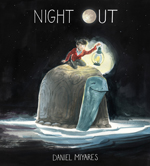 This nearly wordless book opens with a young boy in a boarding school who eats separately at dinner and lies awake while his peers sleep. After receiving an invitation with the words “the honor of your presence is requested,” the boy looks out the window at a full moon, trying to decide if he will accept the invitation or not. Who could the invitation be from? What kind of adventure awaits? Should he follow the enclosed map? The boy exits the window and takes off on his bike under the moonlight. The gouache and colored pencil illustrations capture the mystery of nighttime as the boy travels across the countryside. The color palette changes as he meets new friends and enjoys a party at his destination. The story unfolds much like a dream, allowing children to bring their imaginations to the narrative as they wonder what adventures they might have on a night out.
This nearly wordless book opens with a young boy in a boarding school who eats separately at dinner and lies awake while his peers sleep. After receiving an invitation with the words “the honor of your presence is requested,” the boy looks out the window at a full moon, trying to decide if he will accept the invitation or not. Who could the invitation be from? What kind of adventure awaits? Should he follow the enclosed map? The boy exits the window and takes off on his bike under the moonlight. The gouache and colored pencil illustrations capture the mystery of nighttime as the boy travels across the countryside. The color palette changes as he meets new friends and enjoys a party at his destination. The story unfolds much like a dream, allowing children to bring their imaginations to the narrative as they wonder what adventures they might have on a night out.
—LC
Otis and Will Discover the Deep: The Record-setting Dive of the Bathysphere. Barb Rosenstock. Ill. Katherine Roy. 2018. Little, Brown.
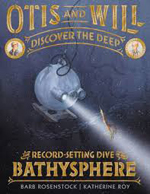 This nonfiction picture book tells the story of two men obsessed with the sea. Otis Barton, an engineer, and Will Beebe, a naturalist, both wondered what the deep ocean looked like. In the 1930s they worked together to build a diving tank called the Bathysphere that would allow explorers to go deeper than ever before. The dramatic text and mixed-media illustrations chronicle their record-setting dive in increments of 100 feet. A wordless double gatefold captures the blue-black beauty of the ocean at the depth of 800 feet. Roy’s lush illustrations portray the time period, the technical details, and action of the underwater world. Sea life is featured on the endpapers with labels. Readers will not be disappointed in the accuracy and depth of content. The ample back matter includes archival photographs as part of the author’s and illustrator’s notes.
This nonfiction picture book tells the story of two men obsessed with the sea. Otis Barton, an engineer, and Will Beebe, a naturalist, both wondered what the deep ocean looked like. In the 1930s they worked together to build a diving tank called the Bathysphere that would allow explorers to go deeper than ever before. The dramatic text and mixed-media illustrations chronicle their record-setting dive in increments of 100 feet. A wordless double gatefold captures the blue-black beauty of the ocean at the depth of 800 feet. Roy’s lush illustrations portray the time period, the technical details, and action of the underwater world. Sea life is featured on the endpapers with labels. Readers will not be disappointed in the accuracy and depth of content. The ample back matter includes archival photographs as part of the author’s and illustrator’s notes.
—LC
The Treasure of Pirate Frank. Mal Peet & Elspeth Graham. Ill. Jez Tuya. 2018. Nosy Crow/Candlewick.
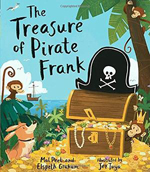 A boy and his faithful dog set out to find the fabled treasure of Pirate Frank, but the unexpected appearance of the treasure’s owner turns out to be the truly priceless discovery. Readers meet the intrepid explorers while traveling to the island of spice and gold. Once there, the pair hunt high and low and follow clues to Pirate Frank’s treasure. Children will be delighted by the rhythmic quality of the cumulative text and the charming digital illustrations. The emphasis on the journey is good news for readers who will thoroughly enjoy returning to the pages of this amusing adventure again and again.
A boy and his faithful dog set out to find the fabled treasure of Pirate Frank, but the unexpected appearance of the treasure’s owner turns out to be the truly priceless discovery. Readers meet the intrepid explorers while traveling to the island of spice and gold. Once there, the pair hunt high and low and follow clues to Pirate Frank’s treasure. Children will be delighted by the rhythmic quality of the cumulative text and the charming digital illustrations. The emphasis on the journey is good news for readers who will thoroughly enjoy returning to the pages of this amusing adventure again and again.
—LK
Ages 9–11
The Last Grand Adventure. Rebecca Behrens. 2018. Aladdin/Simon & Schuster.
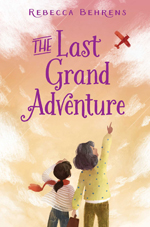 It is July 1967, and 12-year-old Bea is not looking for adventure. She struggles with anxiety and feels safer experiencing adventure through the pages of National Geographic. However, her grandmother Pidge, whom she barely knows, is taking her on a cross-country expedition. Pidge has a suitcase full of letters from her sister, Amelia “Meelie” Earhart, all inexplicably written after the pilot’s disappearance in 1937. The last of the letters hints at a possible reunion for the sisters on what would be Amelia’s 70th birthday. With Meelie’s letters in hand, the duo has four days to travel more than 1,000 miles to the rendezvous point on the banks of the Missouri River. Their journey is long, hard, and rife with disappointment, but Bea blossoms during their trip.
It is July 1967, and 12-year-old Bea is not looking for adventure. She struggles with anxiety and feels safer experiencing adventure through the pages of National Geographic. However, her grandmother Pidge, whom she barely knows, is taking her on a cross-country expedition. Pidge has a suitcase full of letters from her sister, Amelia “Meelie” Earhart, all inexplicably written after the pilot’s disappearance in 1937. The last of the letters hints at a possible reunion for the sisters on what would be Amelia’s 70th birthday. With Meelie’s letters in hand, the duo has four days to travel more than 1,000 miles to the rendezvous point on the banks of the Missouri River. Their journey is long, hard, and rife with disappointment, but Bea blossoms during their trip.
—LK
Secret Sisters of the Salty Sea. Lynne Rae Perkins. 2018. Greenwillow/HarperCollins.
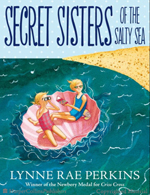 A family road trip to the beach may be a common summer adventure for some, but for Alix and her younger sister, Jools, it’s exciting because it is their first time seeing the ocean. Readers get to know Alix best in this story, which is accompanied by black and white drawings highlighting key elements in the text. While on the beach searching for periwinkles for dinner, Alix discovers sea glass and then learns to make jewelry. On a visit to a wildlife refuge, Alix holds an injured peregrine falcon and later gets to release it back into the wild. From small challenges like flat tires to drifting too far from their beach umbrella to taking risks in a variety of ways, Alix’s first beach vacation will be a memorable one for readers as well.
A family road trip to the beach may be a common summer adventure for some, but for Alix and her younger sister, Jools, it’s exciting because it is their first time seeing the ocean. Readers get to know Alix best in this story, which is accompanied by black and white drawings highlighting key elements in the text. While on the beach searching for periwinkles for dinner, Alix discovers sea glass and then learns to make jewelry. On a visit to a wildlife refuge, Alix holds an injured peregrine falcon and later gets to release it back into the wild. From small challenges like flat tires to drifting too far from their beach umbrella to taking risks in a variety of ways, Alix’s first beach vacation will be a memorable one for readers as well.
—LC
Wed Wabbit. Lissa Evans. 2018. David Fickling/Scholastic.
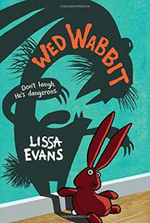 What if you found yourself transported into the world of your favorite children’s book? In Wed Wabbit, Fidge finds herself in her little sister Minnie’s favorite book, The Land of Wimbly Woos, where Minnie’s stuffed rabbit has taken over control of the Wimblies. When Minnie gets hit by a car and is hospitalized, Fidge is sent to stay with her anxiety-ridden cousin Graham. After a fall down the stairs, the two find themselves in Wimbly Land and set out to save the Wimblies, recover Minnie’s stuffed rabbit and other toys, and return home. This action-packed story will have readers on the edge of their seats as Fidge and Graham, along with friends they make in Wimbly Land, figure out how to overthrow Wed Wabbit and restore Wimbly Land to peace. Ella, the stuffed elephant, and Dr. Carrot, Graham’s comfort object, add humor to the story, and various Wimblies surprise themselves and their friends with their bravery. The heroes in the story all bring different strengths to the challenge of getting everyone home safe again.
What if you found yourself transported into the world of your favorite children’s book? In Wed Wabbit, Fidge finds herself in her little sister Minnie’s favorite book, The Land of Wimbly Woos, where Minnie’s stuffed rabbit has taken over control of the Wimblies. When Minnie gets hit by a car and is hospitalized, Fidge is sent to stay with her anxiety-ridden cousin Graham. After a fall down the stairs, the two find themselves in Wimbly Land and set out to save the Wimblies, recover Minnie’s stuffed rabbit and other toys, and return home. This action-packed story will have readers on the edge of their seats as Fidge and Graham, along with friends they make in Wimbly Land, figure out how to overthrow Wed Wabbit and restore Wimbly Land to peace. Ella, the stuffed elephant, and Dr. Carrot, Graham’s comfort object, add humor to the story, and various Wimblies surprise themselves and their friends with their bravery. The heroes in the story all bring different strengths to the challenge of getting everyone home safe again.
—LC
Ages 12–14
The Book of Boy. Catherine Gilbert Murdock. 2018. Greenwillow/HarperCollins.
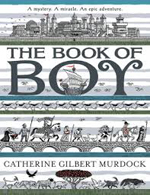 Blending elements of historical fiction and fantasy, this story takes place in Medieval France and involves a long and dangerous journey. The main character, known only as Boy, is a servant in a manor in France who is mistreated because of the hump on his back. Boy travels across Europe with a mysterious and questionable man named Secundus. The land has been ravaged by pestilence, and Secundus is on a mission to find seven relics in order to be reunited in the afterlife with his wife and son. Boy believes that when he arrives in Rome, he will be transformed from a hunchback to a real boy by a miracle. Boy and Secundus have a contentious relationship as they journey to find and steal the relics. While historical and religious vocabulary may challenge some readers, the Indiana Jones-style heists to secure the relics make this an exciting read. The ending is especially satisfying as both Boy and Secundus discover much more about who they really are.
Blending elements of historical fiction and fantasy, this story takes place in Medieval France and involves a long and dangerous journey. The main character, known only as Boy, is a servant in a manor in France who is mistreated because of the hump on his back. Boy travels across Europe with a mysterious and questionable man named Secundus. The land has been ravaged by pestilence, and Secundus is on a mission to find seven relics in order to be reunited in the afterlife with his wife and son. Boy believes that when he arrives in Rome, he will be transformed from a hunchback to a real boy by a miracle. Boy and Secundus have a contentious relationship as they journey to find and steal the relics. While historical and religious vocabulary may challenge some readers, the Indiana Jones-style heists to secure the relics make this an exciting read. The ending is especially satisfying as both Boy and Secundus discover much more about who they really are.
—LC
The Boy from Tomorrow. Camille DeAngelis. 2018. Amberjack.
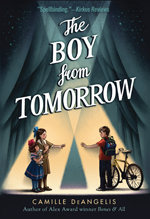 Twelve-year-olds Josie and Alec meet and form a bond while using the same Ouija board in the same house on Sparrow Street although they are living 100 years apart. Through late night “discussions,” Josie and Alec solidify their friendship and their commitment to helping each other resolve their respective predicaments. When Josie finds new ways to communicate with Alec after her mother takes away the Ouija board, it gives him strength to deal with the pain of his parents’ divorce and the stress of starting over in a new town. Bolstered by Alec’s research and encouragement, Josie finds the courage to plot her escape from her mother’s abusive ways. This fast-paced story stays with the reader long after the book’s conclusion.
Twelve-year-olds Josie and Alec meet and form a bond while using the same Ouija board in the same house on Sparrow Street although they are living 100 years apart. Through late night “discussions,” Josie and Alec solidify their friendship and their commitment to helping each other resolve their respective predicaments. When Josie finds new ways to communicate with Alec after her mother takes away the Ouija board, it gives him strength to deal with the pain of his parents’ divorce and the stress of starting over in a new town. Bolstered by Alec’s research and encouragement, Josie finds the courage to plot her escape from her mother’s abusive ways. This fast-paced story stays with the reader long after the book’s conclusion.
—LK
Chasing Augustus. Kimberly Newton Fusco. 2018. Knopf/Random House.
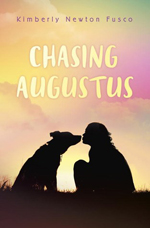 Rosalita, who prefers to be called Rosie, was abandoned by her mother. Her mother also gave away her dog, Augustus, to a stranger. Rosie is determined to find Augustus despite being told repeatedly to give up. Rosie lives with her grumpy grandfather because her father is in a rehabilitation center after suffering a stroke. While he works, Rosie is supposed to help their neighbor, who is mothering a handful of foster kids. Instead, Rosie sneaks out on her bicycle in all kinds of weather, manipulates friends into helping, and even comes up with a complicated plan involving snakes in one of her attempts to rescue Augustus. Rosie is a stubborn risk taker who is fully convinced she will find her dog. Readers will enjoy going along with Rosie on her adventure to find Augustus.
Rosalita, who prefers to be called Rosie, was abandoned by her mother. Her mother also gave away her dog, Augustus, to a stranger. Rosie is determined to find Augustus despite being told repeatedly to give up. Rosie lives with her grumpy grandfather because her father is in a rehabilitation center after suffering a stroke. While he works, Rosie is supposed to help their neighbor, who is mothering a handful of foster kids. Instead, Rosie sneaks out on her bicycle in all kinds of weather, manipulates friends into helping, and even comes up with a complicated plan involving snakes in one of her attempts to rescue Augustus. Rosie is a stubborn risk taker who is fully convinced she will find her dog. Readers will enjoy going along with Rosie on her adventure to find Augustus.
—LC
Ages 15+
The Summer of Broken Things. Margaret Peterson Haddix. 2018. Simon & Schuster.
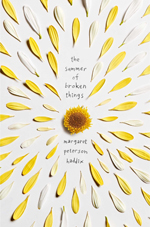 There are two sides to every adventure. Take, for example, Kayla and Avery, the two teenage narrators thrown together in The Summer of Broken Things. Kayla, who comes from a disadvantaged family, is excited about spending the summer in Spain. For the privileged Avery, accompanying her father on an international business trip interferes with plans to attend soccer camp with her friends and being chaperoned by Kayla adds insult to injury. The reader slowly discovers there is more at stake than a quintessential summer adventure as the girls experience the complicated emotions that come with their evolving relationship. When Avery is not sulking, she is somehow managing to always say or do the wrong thing, an exhausting combination, though a realistic personality trait of a spoiled 14-year-old. Kayla makes the best of the situation. In the end, it is a brush with death that brings the girls together when their surprising shared history cannot.
There are two sides to every adventure. Take, for example, Kayla and Avery, the two teenage narrators thrown together in The Summer of Broken Things. Kayla, who comes from a disadvantaged family, is excited about spending the summer in Spain. For the privileged Avery, accompanying her father on an international business trip interferes with plans to attend soccer camp with her friends and being chaperoned by Kayla adds insult to injury. The reader slowly discovers there is more at stake than a quintessential summer adventure as the girls experience the complicated emotions that come with their evolving relationship. When Avery is not sulking, she is somehow managing to always say or do the wrong thing, an exhausting combination, though a realistic personality trait of a spoiled 14-year-old. Kayla makes the best of the situation. In the end, it is a brush with death that brings the girls together when their surprising shared history cannot.
—LK
Time Bomb. Joelle Charbonneau. 2018. Houghton Mifflin.
 A high school is bombed, trapping six students inside. All six have their reasons for being at the school during summer break, but only one of them is there to blow it up. The students manage to find each other amid the wreckage and hole up in a classroom on the second floor. Bit by bit, Charbonneau reveals potentially incriminating details of each student’s backstory, a tactic that keeps the reader on their toes. Time is running out. Bombs continue to detonate, and the students realize they must work together to survive. However, the students do not trust each other and infighting threatens to thwart their tenuous escape plan. Although some readers may guess the bomber’s identity early on, it is a compelling story of survival that is part adventure, part thriller, and part mystery.
A high school is bombed, trapping six students inside. All six have their reasons for being at the school during summer break, but only one of them is there to blow it up. The students manage to find each other amid the wreckage and hole up in a classroom on the second floor. Bit by bit, Charbonneau reveals potentially incriminating details of each student’s backstory, a tactic that keeps the reader on their toes. Time is running out. Bombs continue to detonate, and the students realize they must work together to survive. However, the students do not trust each other and infighting threatens to thwart their tenuous escape plan. Although some readers may guess the bomber’s identity early on, it is a compelling story of survival that is part adventure, part thriller, and part mystery.
—LC
Lesley Colabucci is an associate professor of early, middle, and exceptional education at Millersville University, Millersville, PA. She teaches classes in children’s literature at the graduate and undergraduate level. Leigh Kaliss is the volunteer and outreach coordinator at Lancaster Public Library in Lancaster, PA.
These reviews are submitted by members of the International Literacy Association's Children's Literature and Reading Special Interest Group (CL/R SIG) and are published weekly on Literacy Daily.